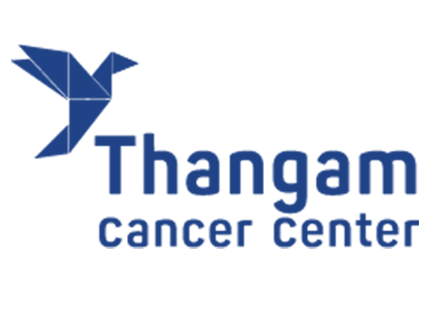If you’re battling cancer, you’ve no doubt encountered numerous hurdles during the course of your treatment. One significant challenge while undergoing cancer therapies is managing their impact on your skin. Did you know that chemotherapy, radiation, and other treatments can make your skin more susceptible to damage from the sun’s ultraviolet rays?
Thangam Cancer Center is one of the best Oncology Hospitals in Dharmapuri that guides and counsels patients on taking the necessary steps to protect their skin from infections and other side effects while undergoing these therapies to ensure their overall health and well-being.
Do you know that during chemo, skin rashes and wounds are common? They lead to skin breakage and an increased risk of skin infections. While these issues can occur in any individual who does not suffer from cancer, cancer treatment elevates the risk of infection due to allergic reactions to certain medications and the use of surgical tape for wound care.
Skin forms the protective layer and is our body’s biggest organ, which protects it from germs and other foreign particles. In normal individuals when wounds and rashes appear, they heal after sometime without any difficulty. However, in cancer patients who are undergoing therapies, their ability to heal and fight infection decreases. Wounds and rashes do not heal well and simple skin breakage gets easily infected due to low immunity levels.
Skin infections significantly impact cancer treatments, as you will have to take antibiotic medications to treat them which can delay chemotherapy or radiation treatment schedule.
Hence, it’s vital to keep your skin healthy and prevent skin infections while undergoing cancer treatments. It involves understanding and taking necessary measures to avoid any side effects while undergoing treatments.
Some of the challenges you might have to deal with while undergoing therapies:
- Your skin might become dry, sensitive and itchy causing scratch wounds and sores.
- Some cancer medications can cause skin peeling and blisters on your hands and feet.
- Frequent hand washing and using sanitizers to fight infections make the surface of your hands dry and irritant.
- Certain drugs can cause allergic reactions and sun sensitivity leading to allergies and excessive sunburns.
- You might also experience your nails becoming brittle and fragile causing your nails to break which can be painful.
- Chemo drugs lower your immune system, increasing the risk of infection
If you are looking for the best Oncology Hospitals in Namakkal get in touch with Thangam Cancer Center. Our doctors provide the necessary guidance on making some simple changes to your skincare routine that can help you steer clear of skin problems and keep your skin healthy.
If you are suffering from cancer and undergoing therapies taking the following measures enable you to keep your skin healthy and free from any problems:
1) Use a gentle hydrating skincare routine:
- Ensure your everyday skincare routine includes gentle hypoallergenic skin cleansers followed by deeply hydrating moisturizers to prevent skin dryness and sensitivity. Make sure to avoid cleansers and moisturizers with fragrance, anti-ageing and anti-acne ingredients like salicylic acids, glycolic acid (AHAs) and retinol which can cause allergies
- Use a gentle pH-balanced cleanser or a soap that is free from fragrance, exfoliating ingredients and botanical essences that can cause allergic reactions.
- Always take time to rinse your skin well after using soap or a cleanser, since soap and cleanser residues can remove lipids and eventually damage keratin protein.
- Avoid taking baths in steamy hot water, ensure your water is just warm enough as it leads to loss of intercellular lipids in your skin’s barrier layer.
- Always remember to apply moisturizer immediately after towelling your skin dry, it helps to trap water that your skin just absorbed.
This hydrating and gentle skincare routine protects your skin from various skin problems associated with chemotherapy medicines, chapped skin due to harsh weather, etc. It also helps in healing any disturbance in your skin’s epidermal barrier. Adopting a proper skincare routine allows you to maintain a healthy epidermis and heal rashes.
2) Protect your skin to prevent photoallergic drug reactions:
- Did you know that some medications can cause your skin to react to UV rays, resulting in a rash or burn? It’s called drug-induced photosensitivity, and it can be caused by antibiotics, chemotherapy drugs, antihistamines, and more.
- When you’re undergoing cancer treatment, you’re likely to be taking a lot of medications, some of which can make your skin extra sensitive to the sun. So, make sure to cover yourself with protective clothing like a long-sleeved shirt and pants and use sunscreen with mineral zinc oxide and SPF 30 or higher.
- Use a wide-brimmed hat to shield your face, scalp and neck from direct sunlight as these areas are more susceptible to getting affected.
- And don’t forget to reapply sunscreen if you’re out in the sun for a while. Remember, UV rays can even come through window glass, so sun protection is key, even when you’re indoors!
3) Adopt a proper wound care routine:
- While dealing with skin issues during chemotherapy, remember it’s important to give your skin the care it needs to heal properly. Our doctors prescribe necessary ointments, so make sure to use them to treat any wounds and rashes that may occur as a result of your treatment.
- Thangam Cancer Center is one of the best Oncology Hospitals in Trichy that guides you on the best wound care routine you can follow, helping your skin heal faster. Our skin protects our body from germs and infections, but during chemotherapy, it becomes more vulnerable. It becomes dry, more fragile, and loses its ability to defend itself from germs and irritants.
Final Thoughts:
Skincare is a vital aspect of patients undergoing cancer therapies to ensure their well-being. Protecting your skin with gentle, hydrating skincare products, shielding your skin from the harsh sun’s rays, and promptly treating any skin wounds that may occur can help defend your skin against the harmful rays of the sun.
Beyond following the above approaches, you can also stay in the shade whenever possible and drink a lot of fluids to keep your body hydrated. By following these precautions, you can protect sensitive skin and reduce discomfort. Undergoing cancer therapies can be tough and managing your skin health should not burden you. By following the right strategies and using the right products you can be confident about protecting your skin.

